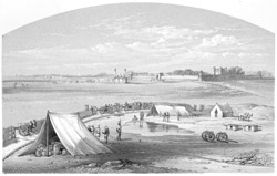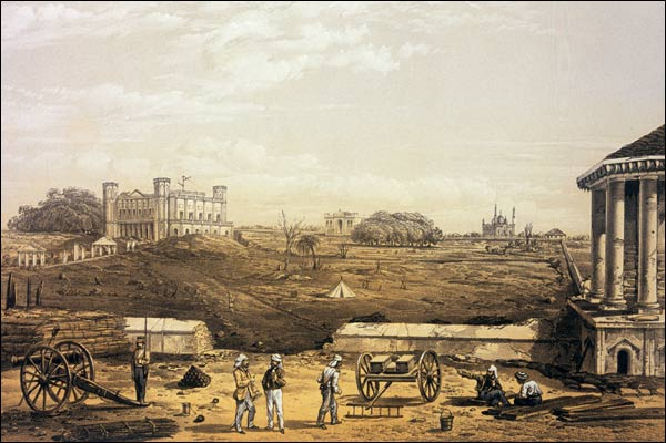

A SOLDIER'S LETTER FROM THE INDIAN MUTINY
This article was originally published in the August 2012 edition of Soul Search, the journal of The Sole Society
In May of 1857 Indian sepoys (soldiers) from the British Indian army mutinied at Meerut in North India triggering a year-long uprising against the British, seriously threatening their rule in the country. The siege of Lucknow was a key episode of the conflict, and the garrison at the Residency came under tremendous pressure from rebel forces. Troops under General Henry Havelock captured Lucknow on 25 September 1857. However, a second rebel force arrived and besieged the town again with Havelock and his troops caught inside the blockade. In November 1857 troops under Sir Colin Campbell advanced to the Lucknow Residency and finally relieved the town.
Introduction
Some time ago I was lucky enough to find letters written by the nephew of my 3x great grandfather in the Ipswich Journal. Joseph Charles Sewell joined the East India Company and became a Sergeant with the 1st Battalion of the 5th Foot Northumberland Fusiliers. They were sent to India to fight the India Mutiny of 1857 and were involved in the Siege of Lucknow. Joseph’s father gave some of the letters he received to the Ipswich Journal for publication as there was great interest in the war back home. The letters describe the march from Cawnpore to Lucknow, and fighting with rebels on the way. At Lucknow they were able to relieve the first siege in September 1857, but were unable to take the city and were themselves besieged until relieved two months later in November. The British finally captured the city in March 1858.
Joseph Charles Sewell was born in Ipswich on 18th February 1831 and baptised 25th December 1836 at St Margaret’s Ipswich. He was the fourth of nine children of James, a hatter and Letitia née Stevens. On 20th August 1848 in St Pancras London he married 16 year old Rose Ann Button also from Ipswich the daughter of Samuel Button a tailor. The marriage certificate shows Joseph as a Law Clerk. In 1851 the couple were living in St Botolph’s, Bishopsgate in London.
Two of Joseph’s letters were published in the 6th February 1858 edition of the Ipswich Journal and are dated 29th November 1857 and 10th December 1857. The third letter was published in the Ipswich Journal on 5th June 1858 and dated March 26th 1858. The following are some extracts from Joseph’s letters describing the fighting and conditions they endured.
The Letters
At the time of writing the first letter, Joseph is stationed at a Camp at Alum-Bagh near Lucknow and describes the relief of the first siege of Lucknow. Joseph writes that:
after great hardships and severe fighting we are encamped here for a few days, and this was the first opportunity any of us have had of writing for some months.

Alum Bagh, from the advance 24-pounder Battery Picket’, a lithograph by Sir D. S. Dodgson. © British Library Board, X270(18) .
His last letter previous to this had been written on the 18th September when they were stationed in Cawnpore. On the 19th September they had proceeded from Cawnpore (belonging to General Havelock’s Brigade) crossing the river by a bridge of boats to the Oude frontier side:
Advanced about 6 o’clock, made a charge, and completely put the enemy to the rout in great confusion.
The action lasted about two hours and the British took three guns, and continued to follow the enemy. Despite torrential rain on the following two days they marched about 20 miles each day and at night rested in villages. On the second night Joseph was on outlaying picquet [a line forward of the position to warn against an enemy advance]:
This night, and such a night I was never out in before: in an open field, with nothing for a shelter, over my shoes in water, and it pouring with rain as if Heaven and earth were coming together.
The column marched on steadily, to find that the enemy had taken up a strong position at Alum-Bagh:
our troops advanced, and between 12 and 1 at noon the action commenced, which while it continued was a hard fought battle, the firing on both sides was very sharp, and continued about half-an-hour, when our troops charged upon a large bungalow and garden surrounding it, which the enemy had strongly fortified; we charged them from this position, capturing five guns. The action continued with incessant firing about this for about three hours, and at dark our troops took up the position we had driven the enemy out of. Our loss this day could not have been less than about 130 were killed and 300 wounded – of our regiment we had 1 adjutant and 3 men killed and 9 men wounded.

Sketch of Lucknow's Alam Bagh, by Lt C. H. Mecham
They remained at Alum-Bagh until the 25th when they began to march on Lucknow, which was difficult and dangerous as in front was a two-gun battery firing grape and round shot, and between 20,000 and 30,000 of the enemy. Joseph received a hit:
from a discharge of grape in my right wrist, which took all the power away from my arm for some time, but thanks be to God, did me no further injury.
They eventually charged the battery and captured the two guns, despite a most murderous fire of grape and musketry:
We skirmished through a jungle, and then a small village, killing the rebels in great numbers, and putting thousands of them to flight. While proceeding through a street in the village, the enemy fired a gun in our rear, which had the range of the street, and swept several before it. A poor fellow before me and a sergeant behind me received their death wounds, a grapeshot having struck both of them in the neck: our interpreter, just by my side, had his horse shot from under him.
They continued to advance until they arrived near the Old Palace of the King of Oude at Lucknow between 3 and 4pm, where they were fired upon before it was decided to storm the Palace:
My company (No8) and No6 were the companies who were the first to charge the entrance gate of the same [the Palace], which we did in spite of a large gun placed in the gateway, which was fired as we were advancing, but doing no harm. We immediately charged and gained an entrance, the remainder of the troops coming up, succeeded in driving the enemy from this part of the palace.
They crossed a bridge to charge the Palace gate against the fire of musketry, only the captain of the company -
a most gallant officer - was wounded in the leg, and I am sorry to say, has since died.
After gaining possession of part of the Palace, they made their way to an intrenched camp where the 32nd Regiment and between 500 and 600 women and children were hemmed in by the rebels, and expecting every moment to be put to death. That night the brigade remained in the road, after a hard day’s fighting. Joseph goes on:
and I can assure you that after having had my dram and a small portion of biscuit, I laid down on the roadway and slept on the roadway as soundly as if I had been on the best featherbed.
A portion of the baggage had been left a short distance from the Palace with the 90th Regiment, and Joseph’s regiment was ordered in the morning to go down to reinforce them with the view of escorting them in. A number of the sick and wounded, who had been also left behind, were sent on under escort in advance:
unfortunately the enemy on their way to the palace came down upon them in great numbers, and cut off 51 doohlies, with the poor fellows in them. They (the enemy) took them into one of the courtyards of the palace, where we could see them, but in such a situation that we could not get to them in proper time to prevent their destroying the sick and wounded, and the horrid wretches, when they found we were about to attempt to release them, set fire to the doohlies, with the poor helpless creatures in them, burning them alive, after the poor fellows had most of them been dreadfully wounded.
Fighting continued until finally on the 28th they were able to drive the enemy out and take possession of King Oude’s Palace, with a communication to the intrenched camp. However the 30-40,000 strong enemy now surrounded the Palace on all sides, so that they were besieged until Monday the 16th November when Sir Colin Campbell arrived with reinforcements to relieve Lucknow for the second time. Joseph gives some idea of conditions:
We had shocking bad times while besieged, our daily allowance being 12ozs meal, 1¼ozs rice and ¼lb meat, no tea, or anything else: but the history of the time we were besieged, should I be spared, you shall see at some future time, but no doubt you will see by the newspapers our gallant deeds.
They finally retired from Lucknow with the women, children and treasure, on the 23rd November, to the camp at Alum-Bagh. Joseph gives some idea of the amount of treasure captured by the British:
I don’t suppose such treasure - I mean to such a large amount - was ever marched by an army before; the money alone must come to upwards of seven million pounds sterling! Besides several million pounds’ worth of precious stones and other property. I expect when all the treasure etc is got down, the army will return with more reinforcements, and that we shall march on Lucknow again, destroy the city, and massacre every individual we get in it. It is the finest city ever could behold…27 miles in circumference.
It is impossible at present for me to send you the amount of the loss of the English, but it has been very great, but our enemies have lost thousands.
He ends:
P.S.- You must excuse the scribbling, for I am writing on the ground.
To be continued…..